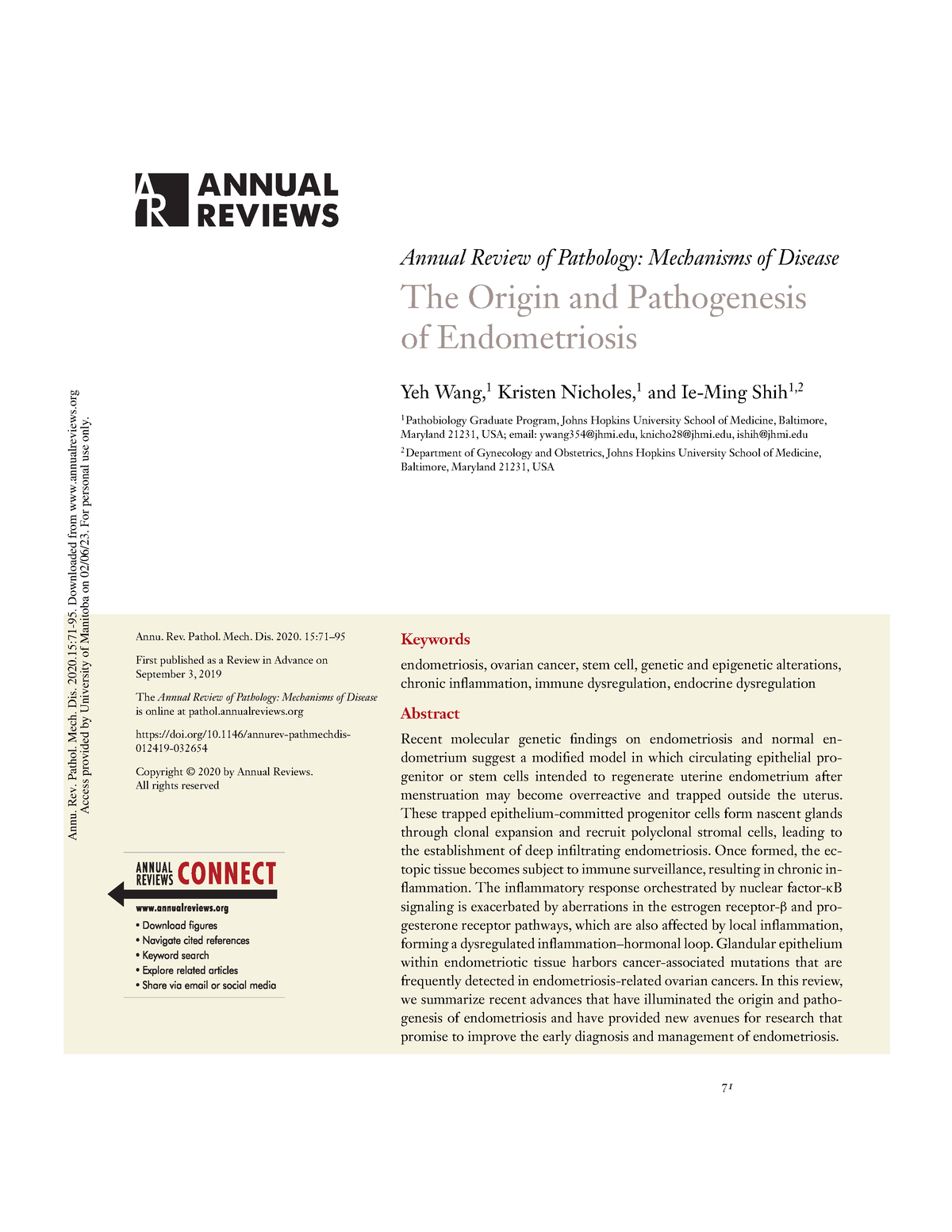Clonal Hematopoiesis in Nonmalignant Disease: Functional Consequences of Mutated Immune Cells by Clonal Hematopoiesis in the Diseased Tissue.
IF 34.5
1区 医学
Q1 PATHOLOGY
Annual Review of Pathology-Mechanisms of Disease
Pub Date : 2025-09-10
DOI:10.1146/annurev-pathmechdis-111523-023442
引用次数: 0
Abstract
Clonal hematopoiesis, originally identified as a precursor to hematologic malignancies, has emerged as a significant factor in various nonmalignant diseases. Recent research highlights how somatic mutations in hematopoietic stem cells lead to the expansion of circulating mutated immune cells that exert profound effects on organ function and disease progression. These mutated clones display altered inflammatory profiles and tissue-specific functional consequences, contributing to various diseases including atherosclerotic cardiovascular disease, osteoporosis, heart failure, and neurodegenerative conditions. Key mutations, particularly in genes regulating epigenetics (TET2, DNMT3A, ASXL1), splicing (SF3B1, U2AF1), and DNA damage repair (TP53, PPM1D), modify immune responses and promote chronic inflammation. Intriguingly, while clonal hematopoiesis exacerbates many inflammatory conditions, it has been linked to a protective effect in Alzheimer's disease, potentially due to enhanced microglial function. Understanding the mechanistic underpinnings of clonal hematopoiesis in nonmalignant disease may inform targeted therapeutic strategies, particularly those aimed at modulating inflammation. This review explores the gene- and organ-specific roles of clonal hematopoiesis, highlighting its implications for disease pathogenesis and potential interventions.非恶性疾病中的克隆造血:病变组织中克隆造血导致免疫细胞突变的功能后果。
克隆造血,最初被确定为血液系统恶性肿瘤的前兆,已成为各种非恶性疾病的重要因素。最近的研究强调了造血干细胞的体细胞突变如何导致循环突变免疫细胞的扩增,从而对器官功能和疾病进展产生深远影响。这些突变克隆显示出改变的炎症谱和组织特异性功能后果,导致各种疾病,包括动脉粥样硬化性心血管疾病、骨质疏松症、心力衰竭和神经退行性疾病。关键突变,特别是在调节表观遗传学(TET2, DNMT3A, ASXL1),剪接(SF3B1, U2AF1)和DNA损伤修复(TP53, PPM1D)的基因中,改变免疫反应并促进慢性炎症。有趣的是,虽然克隆造血加剧了许多炎症状况,但它与阿尔茨海默病的保护作用有关,可能是由于小胶质细胞功能增强。了解非恶性疾病中克隆造血的机制基础可以为有针对性的治疗策略提供信息,特别是那些旨在调节炎症的治疗策略。这篇综述探讨了克隆造血的基因和器官特异性作用,强调了其在疾病发病机制和潜在干预措施中的意义。
本文章由计算机程序翻译,如有差异,请以英文原文为准。
求助全文
约1分钟内获得全文
求助全文
来源期刊
CiteScore
62.60
自引率
0.00%
发文量
40
期刊介绍:
The Annual Review of Pathology: Mechanisms of Disease is a scholarly journal that has been published since 2006. Its primary focus is to provide a comprehensive overview of recent advancements in our knowledge of the causes and development of significant human diseases. The journal places particular emphasis on exploring the current and evolving concepts of disease pathogenesis, as well as the molecular genetic and morphological changes associated with various diseases. Additionally, the journal addresses the clinical significance of these findings.
In order to increase accessibility and promote the broad dissemination of research, the current volume of the journal has transitioned from a gated subscription model to an open access format. This change has been made possible through the Annual Reviews' Subscribe to Open program, which allows all articles published in this volume to be freely accessible to readers. As part of this transition, all articles in the journal are published under a Creative Commons Attribution (CC BY) license, which encourages open sharing and use of the research.

 求助内容:
求助内容: 应助结果提醒方式:
应助结果提醒方式:


